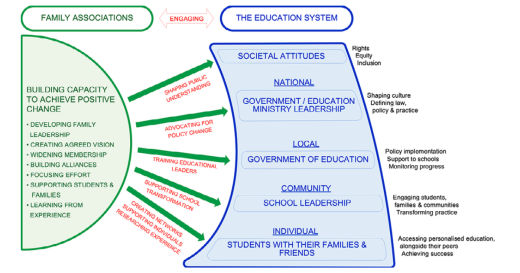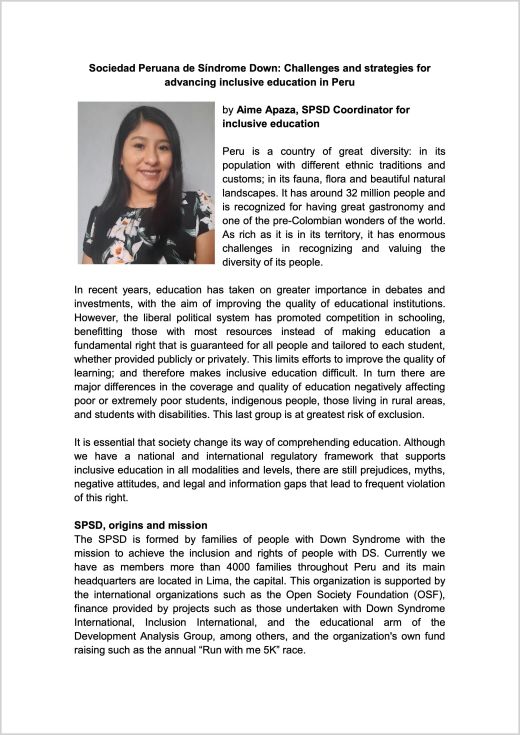In the first of a new 5 part series, David Towell shares how Family Associations in Peru are working to advance inclusive education.
Author: Aime Apaza with a Foreword by David Towell
Ever since families first came together in the field of intellectual disability to share their experiences with each other and campaign for better support, education for their children has been a top priority. Increasingly, many national family associations have made their focus delivery of inclusive education, now called for in the fourth of the global Sustainable Development Goals.
This is challenging work. Education systems are large and complex. By comparison, most national family associations and their local partners are small. Leaders of our associations need to work hard both to build their own capacity to achieve positive change and find good ways of engaging with the education system at many levels. The diagram below provides a simple illustration of what this may involve.

Family Associations Working to Advance Inclusive Education
At Inclusion International's Global Congress in 2018, I invited three national leaders from a diverse mix of countries, all mothers of children with intellectual disabilities, to share their different experiences of advocating for educational transformation. Their story is published here.
During 2021 I have taken this further by inviting leaders on education from a wider range of national associations to share their stories. So far we have detailed case studies from Peru, New Zealand, Colombia and Spain with examples from provincial associations in Canada to follow.
The first of these case studies comes from Peru.
The Down's Syndrome Society in Peru (SPSD) is the most visible civil society association working nationally, and through several allies locally, to improve the lives of people with intellectual disabilities. It is led by parents but it is able to attract very well-qualified and committed professional staff to its work.
Aime Apaza, an educational psychologist by qualification, is their lead on inclusive education. She describes here how SPSD has sought to explore and influence Peruvian education through all the routes identified by arrows in the diagram above.
Perhaps most fundamentally, Aime explains how her association has come to see that improving opportunities for students with Down's syndrome requires a commitment to advancing inclusive education for all children and young people. Faced with the huge diversity and massive inequalities in Peruvian society and of course, the extra challenges posed by the pandemic, this is very much work in progress.
Read and download the Peruvian case study in full in English and in Spanish, links below.

The publisher is the Centre for Inclusive Futures.
Advancing Inclusive Education in Peru © Aime Apaza 2021.
All Rights Reserved. No part of this paper may be reproduced in any form without permission from the publisher except for the quotation of brief passages in reviews.
Family Leadership, Inclusion, Peru, Paper